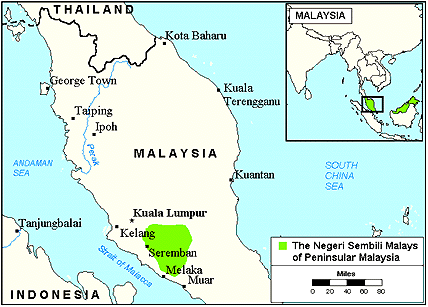|
|
Prayer Profile
The Negeri Malay of Malaysia
![[IMAGE]](../images3/0455.jpg) The Malay are spread throughout Southeast Asia, but are primarily located in the nation of Malaysia. In Malaysia, they make up about half of the population, sharing the nation with Chinese and Indian minorities. Some of these Malay live in the state of Negeri Sembilan, in the southwestern corner of Peninsular Malaysia. They speak Negeri Sembilian Malaysian, a dialect which is closely related to Malaysian and Indonesian.
The Malay are spread throughout Southeast Asia, but are primarily located in the nation of Malaysia. In Malaysia, they make up about half of the population, sharing the nation with Chinese and Indian minorities. Some of these Malay live in the state of Negeri Sembilan, in the southwestern corner of Peninsular Malaysia. They speak Negeri Sembilian Malaysian, a dialect which is closely related to Malaysian and Indonesian.
The Malay of Negeri Sembilan are closely related to the Minangkbau people of Indonesia. They are actually the descendants of Minangkbau immigrants who were gradually assimilated into Malay culture. Since the 1970's, much of Malaysia has industrialized rapidly, its economy one of the fastest growing in the world. Nevertheless, most of the Negeri Sembilan Malay remain poor farmers and fisherman whose economy is dominated by the Chinese living in the nation.
What Are Their Lives Like?
Most Malay living in rural areas grow rice as their main food crop. Rubber is the major cash crop; nearly every farmer is involved to some extent in the rubber industry. Fishing is also an important occupation. In the cities, Malay are becoming involved in factory work and in governmental jobs.
Since much of Negeri Sembilan is covered by jungle, the Malay settle along the coast, rivers, and roads. In villages, houses are built on pilings four to eight feet off the ground and have thatched roofs. The more wealthy Malay have houses with tiled roofs and wooden planks for floors. Local trade is conducted in the larger towns which have markets to serve the surrounding region. An increasing number of Malay have settled in major cities.
In sharp contrast to all other Malay, the Negeri Sembilian Malay have a matrilineal kinship system. This means that ancestry is traced through the female line, and inheritance is passed from mother to daughter. Unlike other Asian societies where daughters are seen as a burden, the Negeri Sembilian Malay consider it vital that a woman have a daughter so that she can keep her inheritance within her immediate family. When a woman has no daughters, her land and property pass to other female relatives after her death.
For recreation, the Malay enjoy socializing in coffee shops. They also enjoy celebrating religious festivals and engaging in religious discussions. One of their favorite pastimes is playing Sepak Raga, a game similar to volleyball.
What Are Their Beliefs?
Religion is a major source of ethnic identity: the Malaysian constitution states that to be a Malay, one must be Muslim. However, even though the Malay identify strongly with Islam, they continue to practice many aspects of their pre-Islamic religions of Hinduism and Buddhism. For example, they commemorate many important events in life such as birth, marriage, and death with non-Islamic rituals. It is common for Nigeri Sembilian Malay who live in rural areas to believe in ghosts, goblins, and spirits; and if medicine is unavailable, a shaman (witch doctor) will often be brought in to treat an illness. For these reasons, other Muslims see the Malay as poor Muslims who have distorted the doctrines of Islam.
What Are Their Needs?
The great majority of Negeri Sembilian Malay are rural farmers and fisherman who struggle to earn a living. Health care, clean water, electricity, education, transportation, and communication are all inadequate.
Only a small minority of Malay have become Christians, though tools to reach them are available. The region of Malaysia in which Negeri Sembilan is located forbids Christian witnessing to Muslims; yet the government continuously attempts to convert Christians and other religious minorities to Islam. The government has imposed numerous restrictions on churches. The people need laborers to work among them, the entire Bible translated into their language, and much intercession so they may be reached with the Gospel.
Prayer Points
- Ask the Lord to send Christian laborers who understand the culture and religion to work with the Nigeri Sembilian.
- Pray that qualified linguists will translate the entire Bible into the Nigeri Sembilian language.
- Pray that the Jesus film will be shown and that it will bring forth much fruit.
- Pray that God will reveal Himself to the Nigeri Sembilian through dreams and visions.
- Pray that the Malaysian government will give the people the freedom to share the Gospel with their countrymen.
- Take authority over the spiritual principalities and powers that are keeping the Nigeri Sembilian bound.
- Ask God to raise up prayer teams who will break up the soil through worship and intercession.
- Pray that God will raise up strong local churches among the Nigeri Sembilian.

Statistics
Latest estimates from the World Evangelization Research Center.
THE PEOPLE
- People name: Negeri Malay
- Country: Malaysia
- Their language: Minangkabau
- Population:
- Largest religion:
- Christians: <1%
- Church members: 86
- Scriptures in their own language: New Testament
- Jesus Film in their own language: Available
- Christian broadcasts in their own language: None
- Mission agencies working among this people: 0
- Persons who have heard the Gospel:
- Persons who have never heard the Gospel: 338,400 (79%)
THEIR COUNTRY
- Country: Malaysia
- Population:
- Major peoples in size order:
- Major religions:
- Number of denominations: 41
© Copyright 1997
Bethany World Prayer Center
This profile may be copied and distributed without obtaining permission
as long as it is not altered, bound, published
or used for profit purposes.
![[HOME BUTTON]](../graphics/home.jpg)
![[CALENDAR BUTTON]](../graphics/calico.jpg)
![[LIST BUTTON]](../graphics/listico.jpg)
[Home]
[Calendar]
[Country List]
|